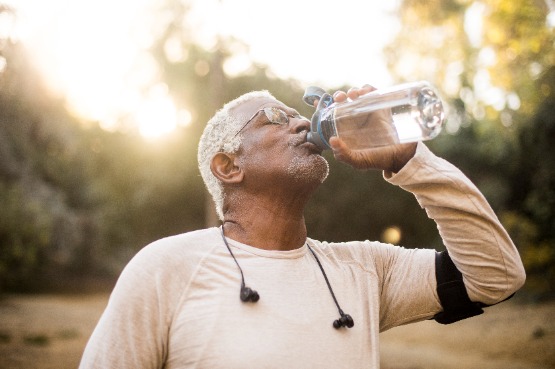Why are vitamins and minerals important?
You’ve probably heard that vitamins and minerals are important. But why are they so essential for a healthy diet? And can you get enough of them without taking supplements? Here, I’ll answer these common questions so you can make sure you’re getting the right amount of vitamins and minerals for good health.

What are vitamins and minerals?
Vitamins and minerals are types of nutrients. They are often described as micronutrients because they are needed in smaller amounts than macronutrients such as protein and carbohydrates.
Although they are needed in smaller quantities, vitamins and minerals are essential for health. Without them you have an increased risk of many different health conditions. Some vitamins can be stored in the body. These are called fat soluble vitamins and include vitamins A, D, E and K. Other vitamins are water soluble, and include vitamin C, B6 and folic acid. You need to replace these more often.
Are minerals or vitamins more important?
Vitamins tend to get more attention, but minerals are equally important. Essential minerals include iron, magnesium, and calcium. Each vitamin and mineral play a key role in keeping you healthy. But they often work together too. So, getting enough of all the vitamins and minerals is important for your health.
Why do we need vitamins and minerals?
While many vitamin supplements advertise micronutrients as being immune boosting, both vitamins and minerals offer many other benefits.
- Bone health. Vitamin D works together with calcium to help reduce your risk of osteoporosis.
- Good vision and skin health. Vitamin A supports your eyesight and vitamin C helps with collagen production which is needed for healthy skin.
- Cellular protection. Some vitamins act as antioxidants which protect your cells from environmental damage.
- Energy levels. Magnesium, B vitamins and iron all work to support your energy levels.
People who don’t get enough vitamins and minerals may be at greater risk of a wide range of health conditions. These include heart problems, certain cancers, cognitive decline, disorders of the immune system, as well as bone and teeth issues.
Which vitamins and minerals are most important?
All vitamins and minerals are important. But your lifestyle and current health might affect which vitamins and minerals you need to prioritise. For example, if you are a vegetarian or vegan then it’s important to get enough B12, iron and omega 3 fatty acids. If you are pregnant then you’ll need to ensure you get enough folic acid, Vitamin D, choline, and DHA (form of omega 3).
There are also nutrients many people in the UK don’t get enough of. For example, up to 49 per cent of girls aged 11-18 don’t meet their recommended intake of iron. This puts them at potential risk of iron deficiency anaemia. Other common low intakes include:
- potassium
- iodine
- selenium
- magnesium
- zinc
What foods have vitamins and minerals in them?
We all know that fruits and vegetables are rich in vitamins and minerals. But you can also find these key micronutrients in foods such as dairy, meat, nuts, seeds, and some grains. Below are some examples of where you can find specific vitamins and minerals.
- Vitamin C – red peppers, strawberries, broccoli, and citrus fruits
- Vitamin E – wheatgerm, sunflower seeds
- Iodine – seafood, iodised salt, milk products
- Magnesium – almonds, dark green leafy vegetables, dark chocolate
- Iron – red meat, spinach, dried apricots
How much of each vitamin and mineral do I need?
You can look up how much of each micronutrient you need to be healthy (PDF, 0.2MB). Ideally, you would get enough vitamins and minerals from your diet. This is more likely to happen if you eat a balanced diet, covering all main food groups.
Focusing on eating a range of different foods can help, as you get different vitamins and minerals from different items. For example, if you always eat peanuts then you will be getting some iron and potassium. But if you alternate these with Brazil nuts and walnuts you can also get selenium and calcium too.
You can get a variety of micronutrients by eating a range of foods from different groups, such as:
- wholegrains including oats, brown rice, and rye bread
- dairy or fortified dairy free products
- nuts, seeds, and legumes
- oily fish, lean meat, and eggs
- berries, dark green leafy vegetables and other colourful vegetables and fruits
What about supplements?
There is mixed evidence about the benefits of taking a multivitamin and mineral supplement. Although they are not a substitute for a healthy balanced diet, there are some occasions when supplementation is recommended.
During the winter in the northern hemisphere (including the UK) vitamin D supplementation is needed. This is because from October – April there is not sufficient sunlight to give you the amount of vitamin D you need to be healthy. Also, during pregnancy it’s recommended you take a folic acid supplement to support the healthy development of your baby’s brain.
If you are unsure about whether you need more vitamins and minerals, then chatting to a registered nutritionist or dietitian can help you to work out what your personal needs are. This is particularly important if you suffer from a chronic health condition, have digestive issues, or are planning to have a child.
Do you know how healthy you truly are? Bupa health assessments give you a clear overview of your health and a view of any future health risks. You'll receive a personal lifestyle action plan with health goals to reach for a happier, healthier you.
-
Sources Sources
- Micronutrients. World Health Organisation. www.who.int, accessed 24 October 2022.
- Vitamins and Minerals. British Nutrition Foundation. www.nutrition.org.uk, accessed 24 October 2022.
- Vitamins and Minerals. National center for complementary and integrative health. www.nccih.nih.gov, accessed 24 October 2022.
- Safari H, Haijan M, Esfahani M et al. Vitamin D and Calcium, together and separately, play roles in female reproductive performance. Scientific reports. 2022; 12:10470.
- Derbyshire E and Obeid D. Choline, Neurological Development and Brain Function: A Systematic Review Focusing on the First 1000 Days. Nutrients. 2020 Jun 10;12(6):1731. doi: 10.3390/nu12061731.
- Sunyecz J. The use of calcium and vitamin D in the management of osteoporosis. Ther Clin Risk Manag . 2008; 4(4): 827–836. doi: 10.2147/tcrm.s3552.
- Sajovic J, Meglič A, Glavač D. The Role of Vitamin A in Retinal Diseases. Int J Mol Sci. 2022 Feb; 23(3): 1014. doi: 10.3390/ijms23031014.
- DePhillipo N, Aman Z and Kennedy M. Efficacy of Vitamin C supplementation on collagen synthesis and oxidative stress after musculoskeletal injuries: a systematic review. Orthop J Sports Med. 2018; 6(10): 2325967118804544. doi: 10.1177/2325967118804544.
- Healthy eating guide. British Dietetics Association. www.bda.uk, accessed 24 October 2022.
- Costello R, Wallace T, Rosanoff A. Magnesium. Advances in Nutrition. J 2016;199–201:7(1). https://doi.org/10.3945/an.115.008524.
- Nutritional considerations for dietitians. British Dietetics Association. www.bda.com, accessed 24 October 2022.
- Iron rich foods. British dietetics association. www.bda.uk, accessed 24 October 2022. Shah A, Dhalla A. Effectiveness of Some Vitamins in the Prevention of Cardiovascular Disease: A Narrative Review. Front Physiol. 2021; 12: 729255. doi: 10.3389/fphys.2021.729255.
- Peterlik M, Grant W and Cross H. Calicum, Vitamin D and cancer. Anticancer Research. 2009; 29(9):3687-3698;https://ar.iiarjournals.org/content/29/9/3687.
- Hughes C, Ward M, Tracey F et al. B-Vitamin Intake and Biomarker Status in Relation to Cognitive Decline in Healthy Older Adults in a 4-Year Follow-Up Study. Nutrients. 2017 Jan; 9(1): 53. doi: 10.3390/nu9010053.
- Athanassiou K, Athanassiou L and Athanassiou P. Vitamin D and autoimmune diseases. 2019. https://www.intechopen.com/chapters/69633
- Selenium. National institutes for health. www.ods.of.nih/gov, accessed 24 October 2022.
- Nutrient information, Walnuts. US department of agriculture. www.fdc.nal.usda.gov, 2018.
- Lauritzen L, Brambilla P, Mazzocchi A et al. DHA effects in brain development and function. Nutrients. 2016 Jan; 8(1): 4. doi: 10.3390/nu8010006.
About our health information
At Bupa we produce a wealth of free health information for you and your family. This is because we believe that trustworthy information is essential in helping you make better decisions about your health and wellbeing.
Our information has been awarded the PIF TICK for trustworthy health information. It also follows the principles of the The Information Standard.

More diet and nutrition articles
Did you find our advice helpful?
We’d love to hear what you think. Our short survey takes just a few minutes to complete and helps us to keep improving our healthy lifestyle articles.
Legal disclaimer
This information was published by Bupa's Health Content Team and is based on reputable sources of medical evidence. It has been reviewed by appropriate medical or clinical professionals and deemed accurate on the date of review. Photos are only for illustrative purposes and do not reflect every presentation of a condition.
Any information about a treatment or procedure is generic, and does not necessarily describe that treatment or procedure as delivered by Bupa or its associated providers.
The information contained on this page and in any third party websites referred to on this page is not intended nor implied to be a substitute for professional medical advice nor is it intended to be for medical diagnosis or treatment. Third party websites are not owned or controlled by Bupa and any individual may be able to access and post messages on them. Bupa is not responsible for the content or availability of these third party websites. We do not accept advertising on this page.






